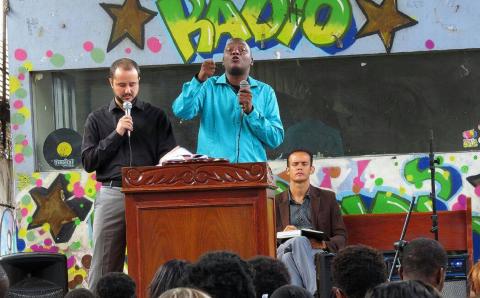I read a memoir recently about a poet who is blind. The author, Stephen Kuusisto, finds new freedom when he gets his first guide dog in his late 30s. While most of Have Dog, Will Travel captures Kuusisto’s years with this spirited Labrador, the book also dips back into the difficulties of his youth in the 1950s and 60s. His parents, who struggled with alcoholism, were ashamed of his blindness and encouraged him to hide it.
Late in the book, Kuusisto recalls wandering into a random church at 17 years old. His young soul is a complex knot of shame, loneliness, and fear. He is battling depression, and his body is dangerously wasting away because of an eating disorder. When the Eucharist is served—a sacrament “of which he knew nothing”—he kneels to partake of the bread and the wine among strangers. As he does so, he feels “his own flesh and blood kissed from somewhere deep and still.”
This is a mystifying and profoundly moving moment for Kuusisto—one that renews his resolve to live. And yet, he notes that he “never mentioned the experience to anyone.” Eventually, of course, he described it in his book, but for decades he kept it to himself.
Kuusisto does not explain exactly why he kept silent all those years—he leaves room for mystery. I do not read his response as motivated by fear or shame, however. The more I reflect on it, the more I appreciate it.
Perhaps I find Kuusisto’s response refreshing because I am reading it within the context of our culture, which gives us more opportunities than ever to instantly broadcast everyday happenings. These days, for example, many of us use social media to rush curated expressions of our life into public space. We can equate visibility with significance.
To be sure, there is empathetic power to sharing our occasions of joy, sorrow, and everything in between, with each other. The act of storytelling can bring the imagery of communion to mind—a kind of passing of the “elements” of our existence among fellow members of the body. Is it selfish, then, to keep a moment to oneself?
I think of the hushed cherishing of Mary. After the shepherds came to worship her son, she “treasured up all these things and pondered them in her heart” (Luke 2:19), and after she and Joseph find young Jesus talking to the teachers in the temple, she again “treasured all these things in her heart” (Luke 2:49-51).
It often takes great trust to share our lives with the exterior world. But experiences intimately held between us and our Creator have value too. Maybe some moments belong in that interior space for a time.
Our listening God is able to use even what is unspoken or unwritten to comfort us, transform us, and shape who we become. For God’s good purposes, he will faithfully equip us to ponder and savor flashes of his grace—to trust in how the quiet works.
About the Author
Adele Konyndyk is a communications writer for World Renew, a creative writer, and a member of First Hamilton Christian Reformed Church in Ontario.







